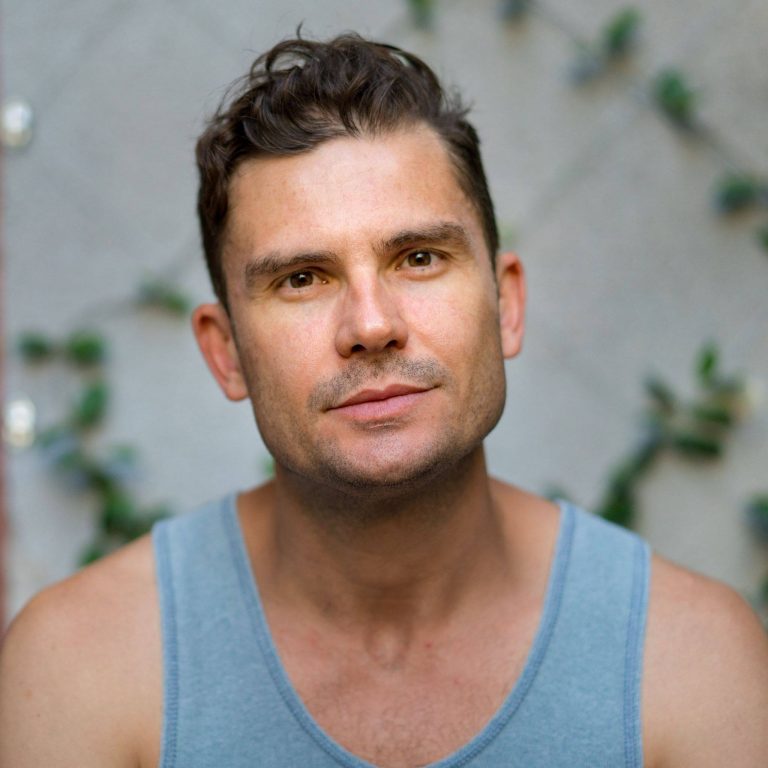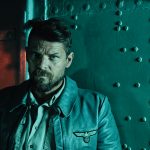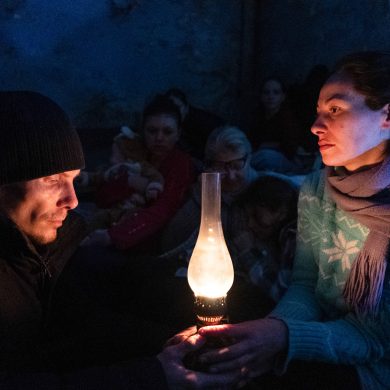Accomplished Melbourne stage director Peter Blackburn has worked on some of the best loved plays in contemporary Australian theatre. When Melbourne went into lockdown he didn’t let the lack of a live audience stifle his creativity as he made the web series The Pact with some of Australia’s finest emerging writers and a series of talented actors, including Rose Flanagan, whose interview you can read here.
Nadine Whitney was given the chance to chat with Peter about his background in theatre, his indefatigable work ethic and some of his favourite films.
First I’d love to know a little about your background in theatre. Can you tell me about some of the live shows you’ve directed?
I’ve been directing for about nine years now, which seems incredible to me, as a couple of years before finally returning to a dedicated career in the Arts, I had been teaching high school for 7 years. I had been an actor in my youth, and I studied English Literature and Film at university, which is a kind of triumvirate foundation for the kind of actors’ director I aspire to remain. I had two mentors change my life in the space of a year in 2012: Larry Moss and Noni Hazlehurst. I am never nonchalant about that impossible good fortune. Firstly, Larry delivered a series of master classes across Melbourne and Sydney (in my time at 16th Street Actors Studio) that shook the industry. He threw down the gauntlet to make work happen and stop waiting for the phone to ring. He insisted that actors (and directors) could make themselves so valuable the industry couldn’t ignore them. He insisted on hard work.
Noni took that challenge too, and in deciding to teach the craft she had long ago mastered for the first time, we were paired to make a kind of hybrid team consisting of one-part genuine legend and one geeky minion to ensure the class ran smoothly and could rattle off dates and facts and historical events in timely fashion. It was undoubtedly the best teaching I have ever been a part of; it lasted 18 months and in that time students began to trust Noni’s championing of me as a budding director and many of my first gigs as a director came from that class. Noni saw something in me and selflessly made a class of exceptionally talented and often well-established actors take note of my analysis (when, I assure you, no-one was there for my input!).
But they did take note. And I started taking offers to direct like time was running out. I directed about 6 plays and a short film in roughly 2 years, and then the second gift came. Larry Moss himself asked for me to assist his direction of Holding the Man in Los Angeles, telling the production company that either I was flown over to stand in for him during the time he was unable to take rehearsals (about 2 and half weeks of a 6 week schedule), or he wouldn’t take the job. Nothing could have prepared me for that validation from the man who had been my inspiration to return to this industry. This was a man sought by leaders of industry across theatre, film and television, and he tapped me on the shoulder as a colleague and confidante. Why? I don’t know fully. Mostly because I did something with the inspiration he tries so authentically to instil. I made art. I didn’t talk about it, I did it. He likes proactiveness.
The plays themselves: for a while I was the go-to guy for anything dark and disturbing. I’ve directed The Shape of Things, The Boys, Lord of the Flies, Next Fall, Stupid Fucking Bird, The Trial of Dorian Gray, Ruben Guthrie, Philtrum, A Town Named War Boy, You Are the Blood, The Campaign, Medea, a few one-person shows for comedy acts, one deceptively ‘light’ comedy called Almost, Maine and a couple more short films, along with short plays for festivals. My Masters showing of four new works from young writers and assisted on two other shows besides Moss’ – with Matt Scholten on The Tempest and with Pete Evans on Bell Shakespeare’s Romeo and Juliet. I will have forgotten something, but that’s a snapshot. Oh, and because I felt like a fraud not having a degree in theatre specifically, I completed my Masters degree at the Victorian College of the Arts in 2016. So it’s been a big nine years.
Directing The Pact via screens must have produced many challenges and some unexpected rewards. Can you tell me a bit about the nuts and bolts of working that way?
Not as many as I expected actually. Because the medium of the production and the form that rehearsals took were almost identical – in that they were calls over Zoom or other such technology – we were able to simulate the environment purposefully. Of course, I much rather lots of space to improvise and run around and make bold choices on the floor, but necessity is the mother of invention, and every actor was game for the more heady, analytic approach into the material, that still required a lot of inner work and sensory exercises. I mean, Morgan (Rose Flanagan) spends much of the time drunk, so I taught a few skills remotely about how to convincingly recreate the experience of altered states, and prodded around the soft parts we humans all have inside us no matter how hard we try to repress or deny them, and we got to work on the mechanics of the scenes as with any rehearsal process I run.
Although you primarily work in theatre I know you are a confirmed cinephile as well. Has any of your directorial style been influenced by screen directors? If so, who would you say is the most influential?
How long have we got again? I’m a country boy – I grew up, mostly, in a little backwater town called Mungindi, which is about eight hours from the coast and ten hours from Sydney. It’s on the Queensland border and is about as far from theatrical life as any place could possibly be in this or any country – but I had film. Film was easily my first great love of visual, sonic and narrative storytelling, and my first exposure to the craft of acting in any meaningful way. When I finally went to the theatre, I was at boarding school and Andrew Lloyd Webber was still the only game in town, so needless to say theatre didn’t get into my bones until I did it for myself through school and community projects, and then much later when I was able to seek out more interesting productions that spoke to my budding sensibilities.
I was – and perhaps still am – much more film literate than theatre literate. Certainly most of my visual and thematic references are filmic. It also helps that, being less ephemeral than theatre, creatives and actors can often grasps filmic suggestions when theatrical ones are too obscure or brief to be a shared language. I could literally write papers on influences from film, so I’ll set myself a task. I’ll name a few auteurs whose work consistently speaks to me (more or less) and then spend more time with three films that more than any other single works impacted not just what I do, but why. So in no particular order, I couldn’t choose a single film from the works of the following, but rather their entire catalogue that have influenced my approach to work: Stanley Kubrick, Alfred Hitchcock, David Lynch, Jane, Campion, Martin Scorsese, Pedro Almodóvar, Robert Altman, Woody Allen (for all the controversy, I cannot deny his impact on my cinematic and philosophical outlook on the world), Elia Kazan, Charlie Chaplin, Mike Leigh, Mike Nichols, Sydney Pollack, Sidney Lumet and, more recently, Sofia Coppola (especially her brilliant debut, The Virgin Suicides). There also Billy Wilder, James L. Brooks and, of course, Orson Welles, and a dozen others, but I’m more selective with this second-tier group.
The three films – and it physically hurts to only pick three – that had the most bearing on wanting to BE a director, and also what it is that a director contributes to a film (and by extension theatre and television) are Cabaret, The Silence of the Lambs and Pulp Fiction. No other work from these makers particularly inspires me, although each has a number of other good pieces of cinema to their names. But, to me, they made this one perfect film each, that hours of poring over in my youth – in that idealistic and passionate age of adolescence – honed my understanding of the complexity of storytelling, aesthetic considerations, editing, theme and tone. With each film, I understood that cinema could be art, and it challenged what I thought cinema could be. Each of these three films added a new layer of understanding to the layers of meaning and, more importantly, the drive to find that meaning for me as a maker and artist.
Many people in Melbourne are reporting feeling distinctly creatively blocked during lockdown, yet with The Pact you have shown that it is possible to still be working and creating via inventive means. What do you think is the secret to keeping on going in a time where many feel so drained?
I definitely don’t have the silver bullet answer to this, and I must say that, apart from being a workaholic to an extent, and attracting other proactive people into my life, such as Gabe Bergmoser, Rose Flanagan and Kash Sinnamon who all had such a strong hand in the making of The Pact, I just lucked out. I am a collaborator who needs the energy of others to ignite my own inner fire, and I was lucky in that a few projects came to fruition or were heavily developed during both lockdowns. Luck is opportunity meeting preparation for me, as I think I mentioned before, so I don’t solely give away my drive to chance; but I have certainly been fortunate that people around me have inspired me and been willing to keep pushing to ensure stagnation doesn’t set in. For me, that’s deathly. For other artists, I have heard people speak of a time to reflect and respond in new ways. For some actors, the pressure of not being on hold, or auditioning for a while has been great for their mental health. It’s definitely affected people differently. I needed to work and was glad I was able to.
The Pact uses a lot of emerging writers, but also one writer in particular, Gabriel Bergmoser is currently blowing up on the bestseller list and headed for big things. What was it like working with different voices taking on parts of the script? Usually in a play you have a single voice creating the blueprint. Would you say this is more like working in television?
I haven’t had the opportunity to work on episodic television professionally, so I can only approximate based on my experience as a teacher of, and responder to, episodic television and it does feel like this was more in that vein, certainly. The writers were able to respond in some cases to things we had filmed, and the series evolved as we went along in real time, which is not the case for theatre, which, even if the play evolves in preparation/rehearsals, is locked by the time the season begins generally. We also had to deal with the fact that new information could be introduced by a writer that we hadn’t previously considered, and this was thrilling. It rarely disrupted the process because Gabe had been so thorough in his preparation and planning for the series. The flexible nature of the series and the shooting also meant that aspects of the backstory and subtexts we created as directorial/actorly choices became elevated to more narrative imperatives towards the end of the series. Morgan’s relationship with her father and the role that addiction and consequences to addictions certainly fit into this category. But this is also the result of being involved with a team of people willing and able to respond to the material in creative and generous ways.
Do you see The Pact as a complete project or are you keen on working on more episodes and taking it further?
I feel that the series is complete in and of itself, and that it could stand alone without needing anything else to make it more meaningful. That said, I think it also has left enough threads in a complicated story to warrant more storylines from alternative perspectives or to follow a minor character through a completely new arc. Each actor and writer did such a fantastic job on making the lives of the characters rich and respected their inner worlds and circumstances that any of them could become the focus of a spin-off series, but it would be tangential rather than a direct sequel I think.
Once the Victorian lockdown is over do you think we will be heading back to live production and theatres in droves? Or do you feel that the industry is a little defeated at the moment and will take a while to resuscitate?
I have great optimism for the future of live performance and cinema attendance – which could be blind hope given that it’s my livelihood and purpose in life, but I don’t think it’s completely unfounded. It has been striking to see that given the opportunity, people have opted to congregate to consume art, and that the forced isolation has been made bearable by access to various media, but so much about many aspects of live theatre, dance, concerts and the like is about the shared, communal experience. Rather than giving in to the pessimistic idea that Covid has normalised home entertainment to an extent that will make our sector struggle for years to come, I rather think it has highlighted for many people how much enjoyment of so much art is enhanced by, and in many cases irreducible from, the communal aspect of its consumption. There is an undeniable need humans have for companionship and togetherness that isn’t solely sated work-oriented tasks. We get it from spectatorship of sports and arts, travel and partying, and some get it from religious gatherings. I think people are missing these things and that we will get back to them with greater enthusiasm after the crisis is over. Perhaps people will appreciate a little more what artists strive to do in the creation of live performance.
What do you feel gave you the most satisfaction whilst working on The Pact?
Making and consuming art has always been important to me. But it took this event for me to know how unwilling I was to live without tangible projects to create and how bereft of some indefinable joy life has been without the communal aspect of art as event. “It is an ill wind that blows know good,” as the saying goes, and I dare to hope. In this time that could have led to despair for someone inclined to extremes such as I am, I found new ways to connect to friends old and new. I collaborated with awesome humans and pushed passed internal blocks to technology and other imaginary ‘impossibilities’. It led me to find ways of being a better human and artist. The only way through the destructiveness of this time for me was creation and connection; and that has been an unexpected and profound realisation – I know I cannot NOT make art and connect with people. That offered some personal comfort in a time of great anxiety.
Watch The Pact via the Bitten By YouTube channel below:




